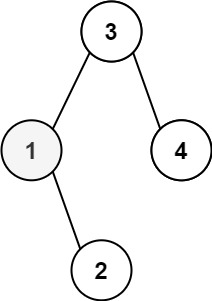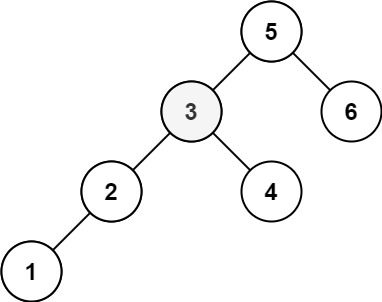LeetCode-in-All
230. Kth Smallest Element in a BST
Medium
Given the root of a binary search tree, and an integer k, return the kth smallest value (1-indexed) of all the values of the nodes in the tree.
Example 1:

Input: root = [3,1,4,null,2], k = 1
Output: 1
Example 2:

Input: root = [5,3,6,2,4,null,null,1], k = 3
Output: 3
Constraints:
- The number of nodes in the tree is
n. 1 <= k <= n <= 1040 <= Node.val <= 104
Follow up: If the BST is modified often (i.e., we can do insert and delete operations) and you need to find the kth smallest frequently, how would you optimize?
Solution
%% Definition for a binary tree node.
%%
%% -record(tree_node, {val = 0 :: integer(),
%% left = null :: 'null' | #tree_node{},
%% right = null :: 'null' | #tree_node{}}).
% Main function to find kth smallest element
-spec kth_smallest(Root :: #tree_node{} | null, K :: integer()) -> integer().
kth_smallest(Root, K) ->
{_, Value} = find_kth_smallest(Root, K, 0),
Value.
% Helper function to traverse the tree and find kth smallest
-spec find_kth_smallest(Node :: #tree_node{} | null, K :: integer(), Count :: integer()) ->
{integer(), integer() | null}.
find_kth_smallest(null, _, Count) ->
{Count, null};
find_kth_smallest(Node, K, Count) ->
% Search left subtree
{NewCount, LeftValue} = find_kth_smallest(Node#tree_node.left, K, Count),
% If we found the value in left subtree, return it
case LeftValue of
null ->
% Increment count for current node
CurrentCount = NewCount + 1,
% Check if current node is the kth smallest
case CurrentCount =:= K of
true ->
{CurrentCount, Node#tree_node.val};
false ->
% Search right subtree
find_kth_smallest(Node#tree_node.right, K, CurrentCount)
end;
_ ->
{NewCount, LeftValue}
end.

